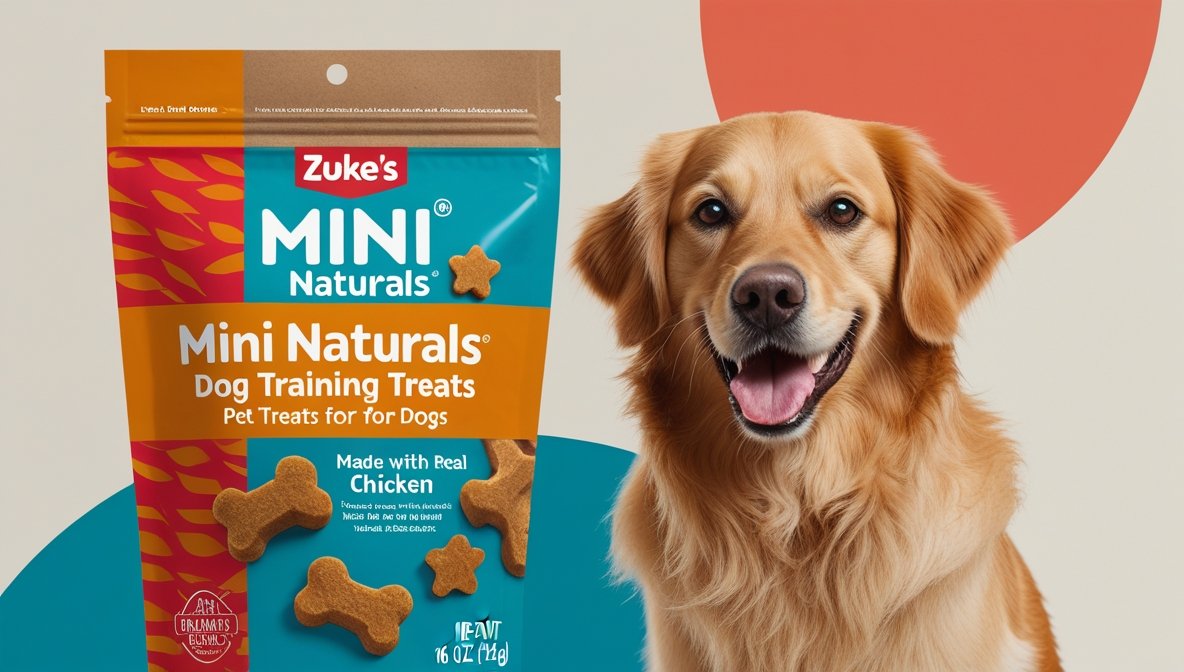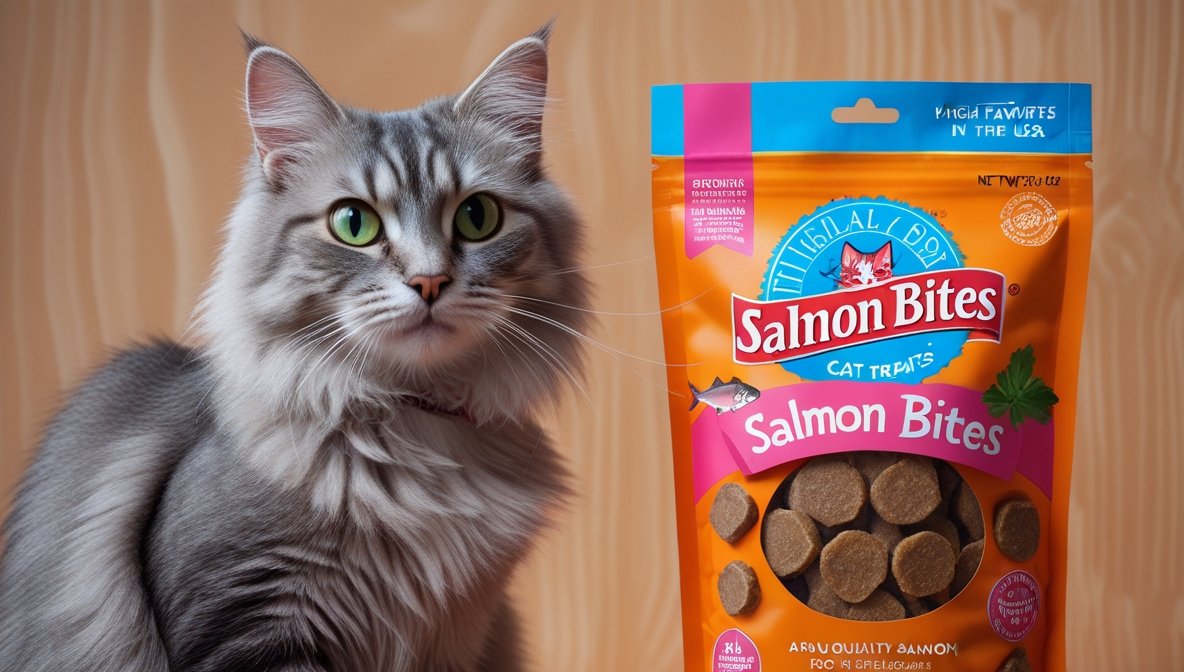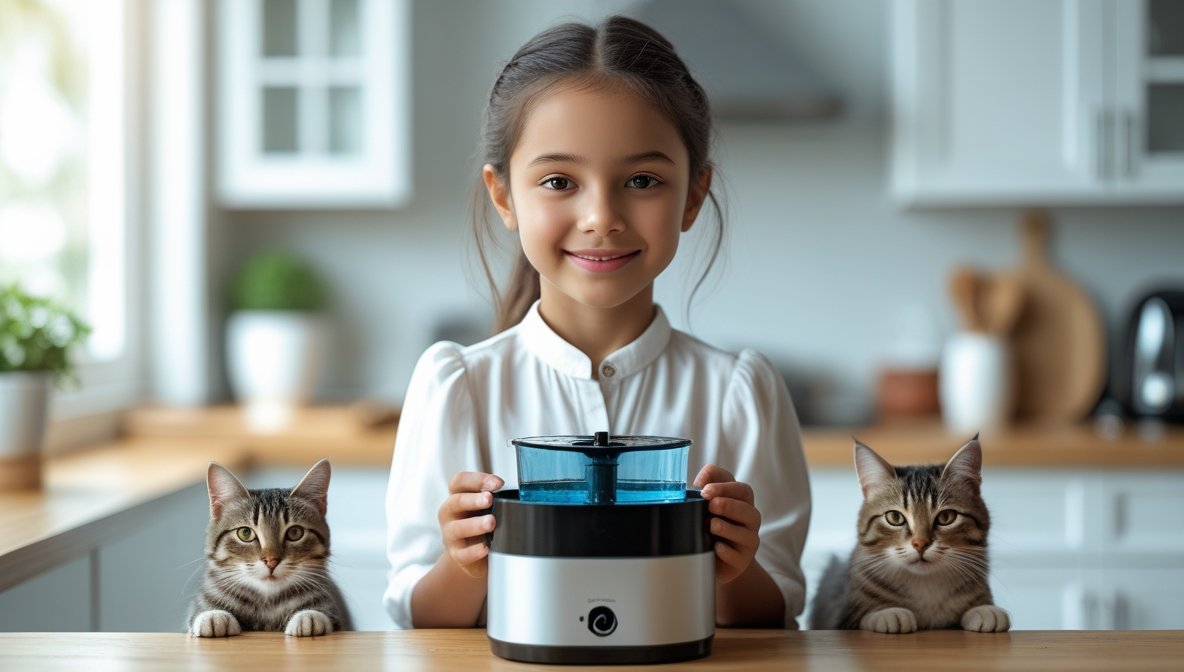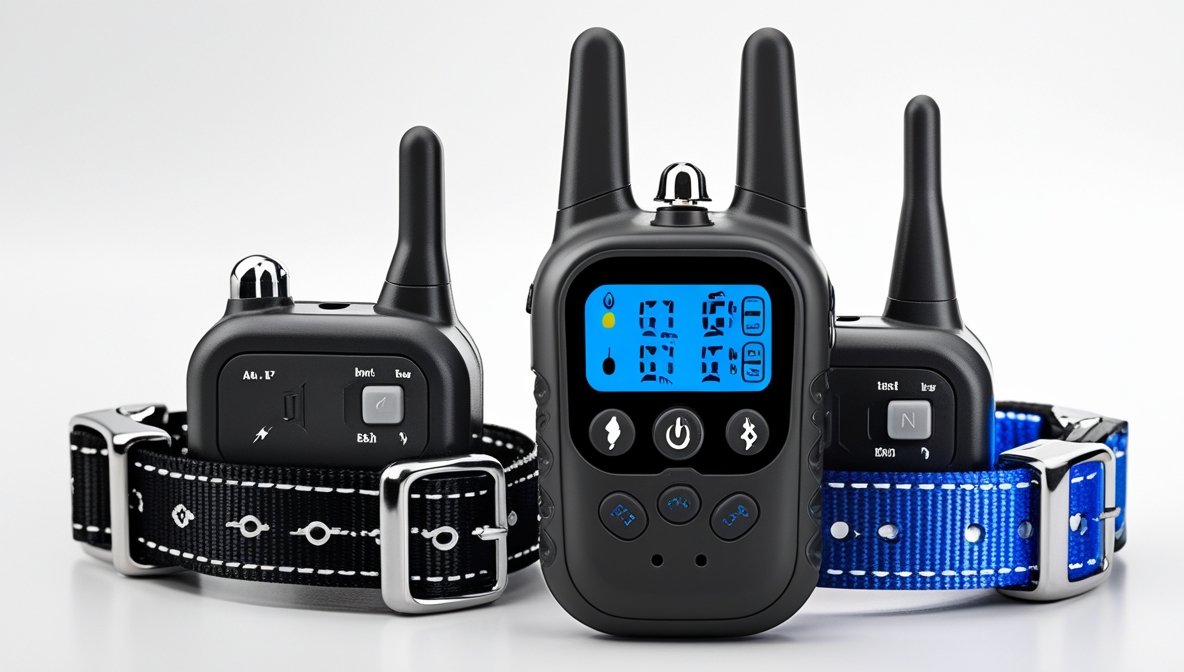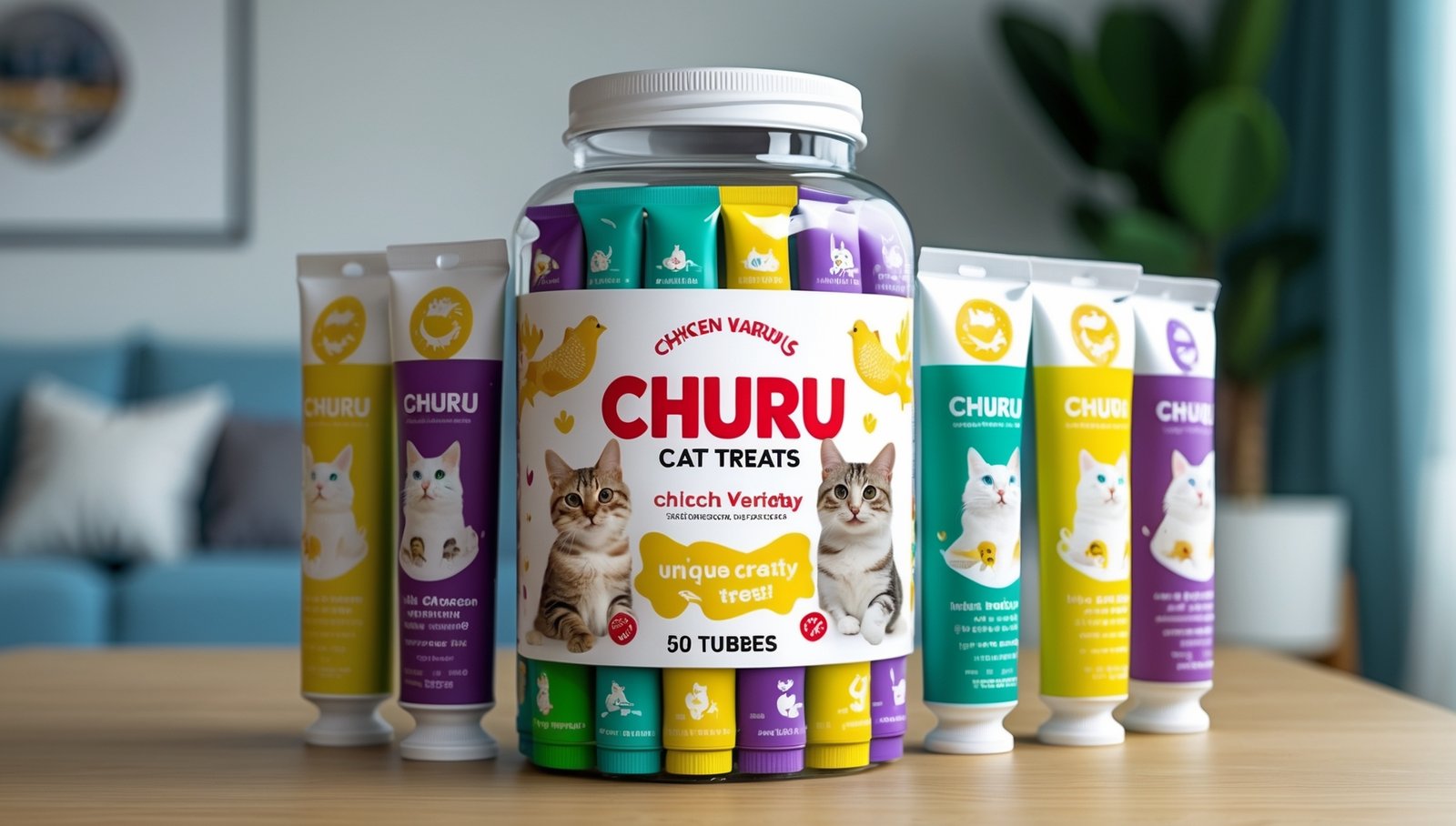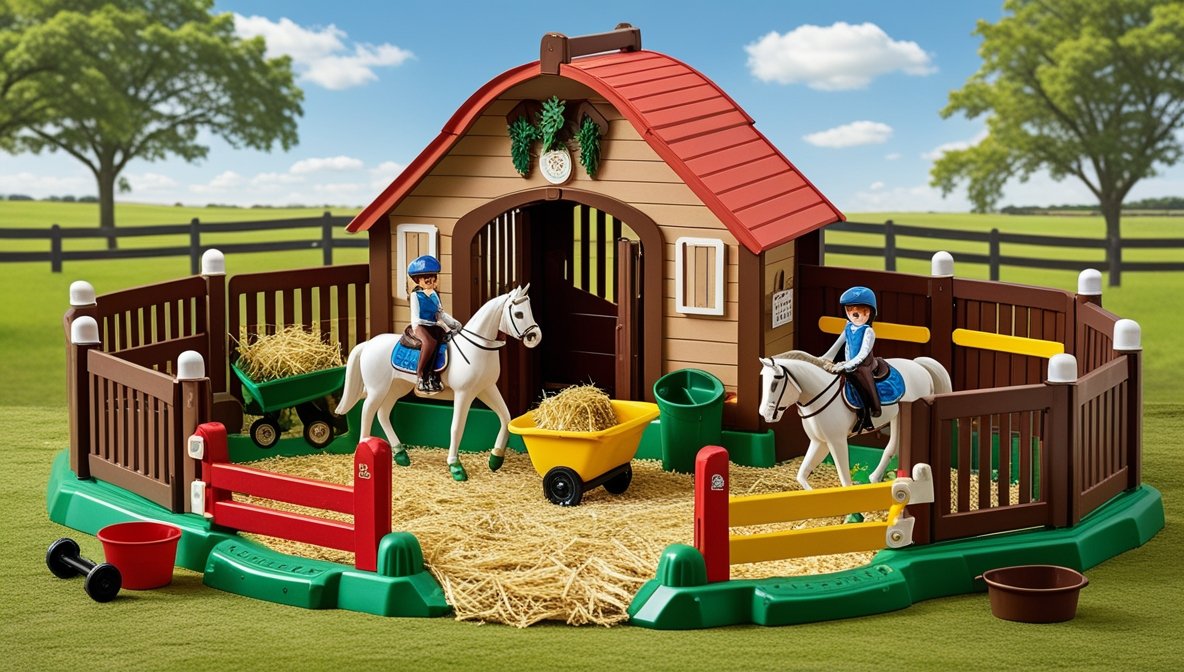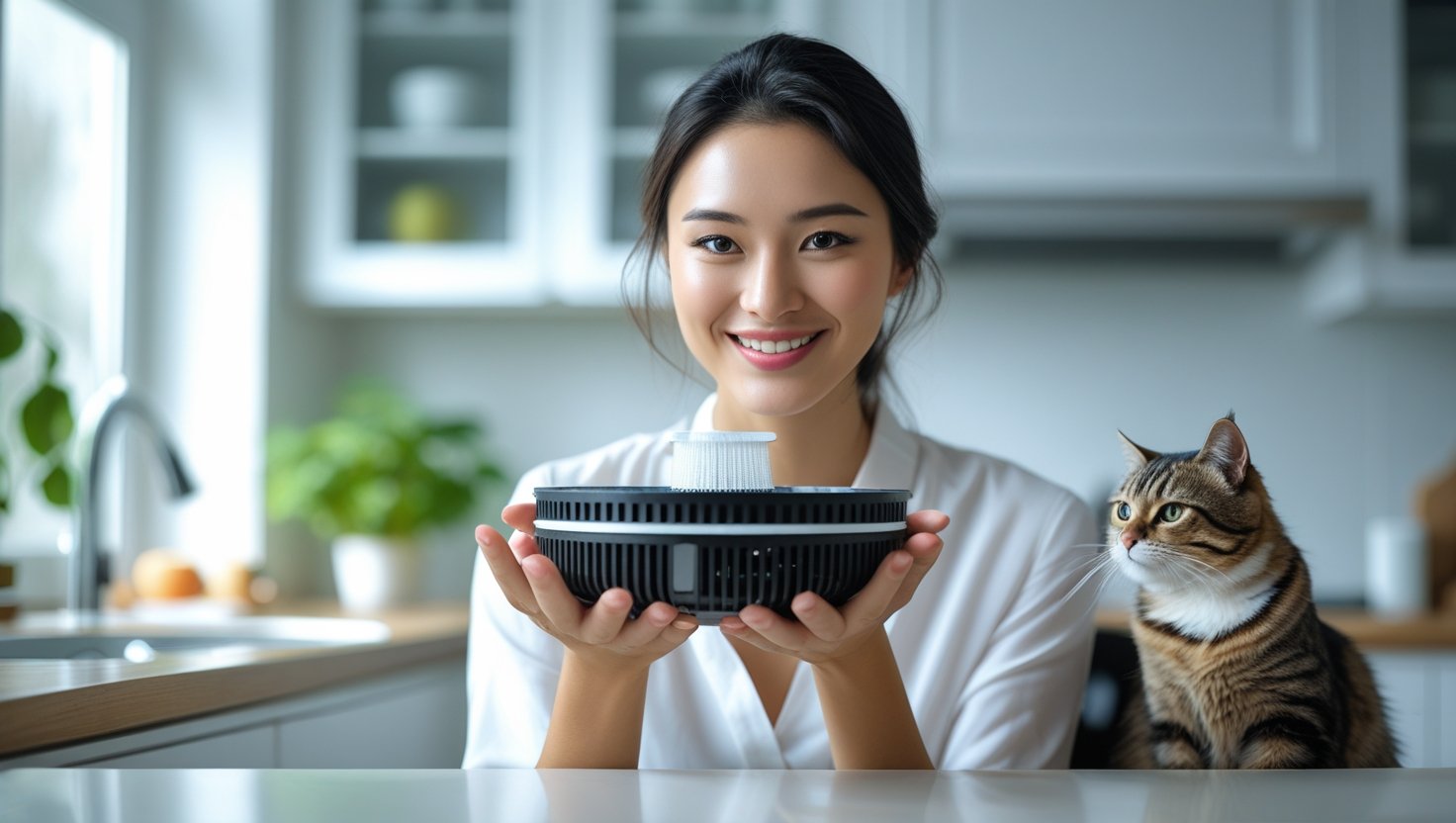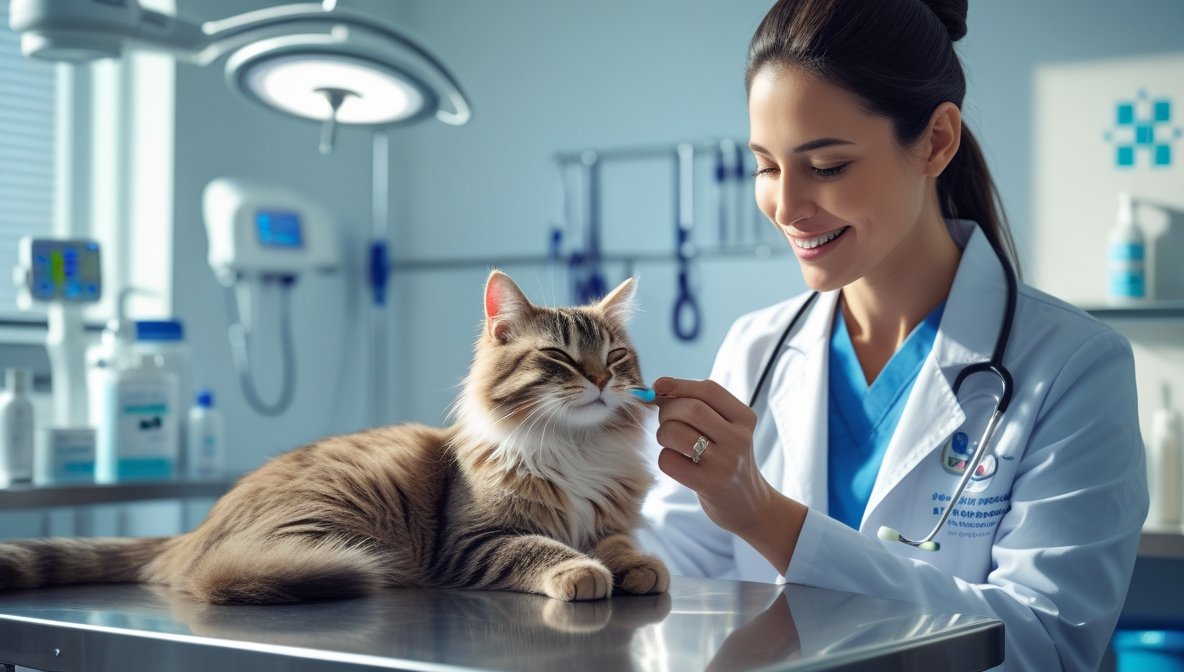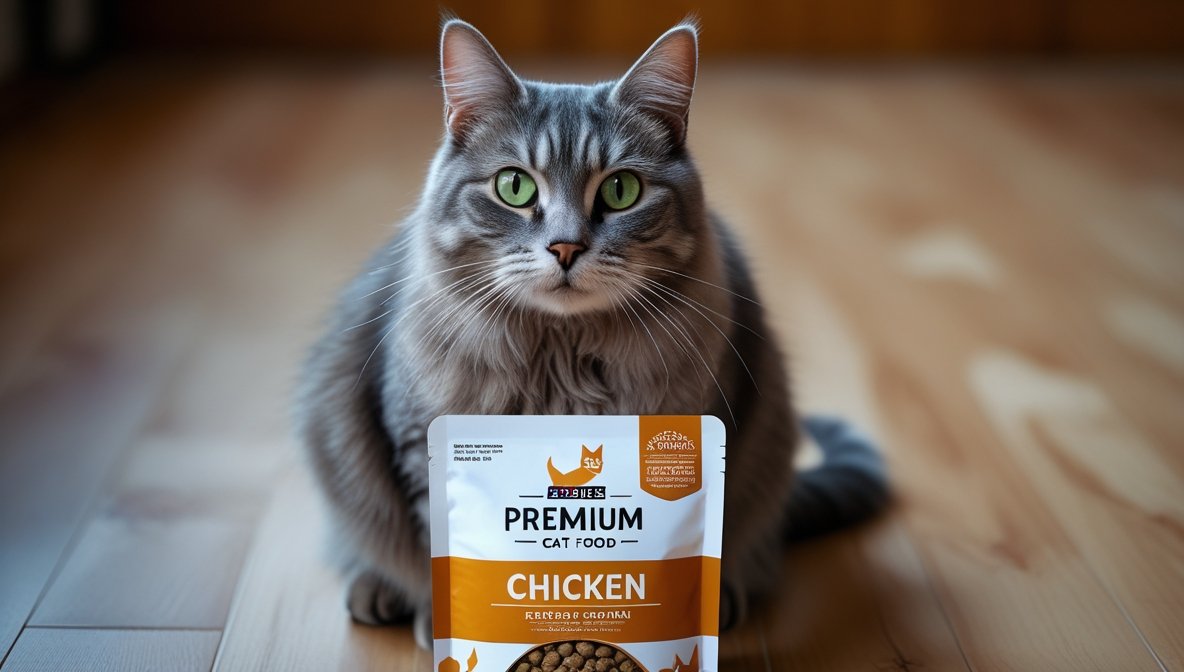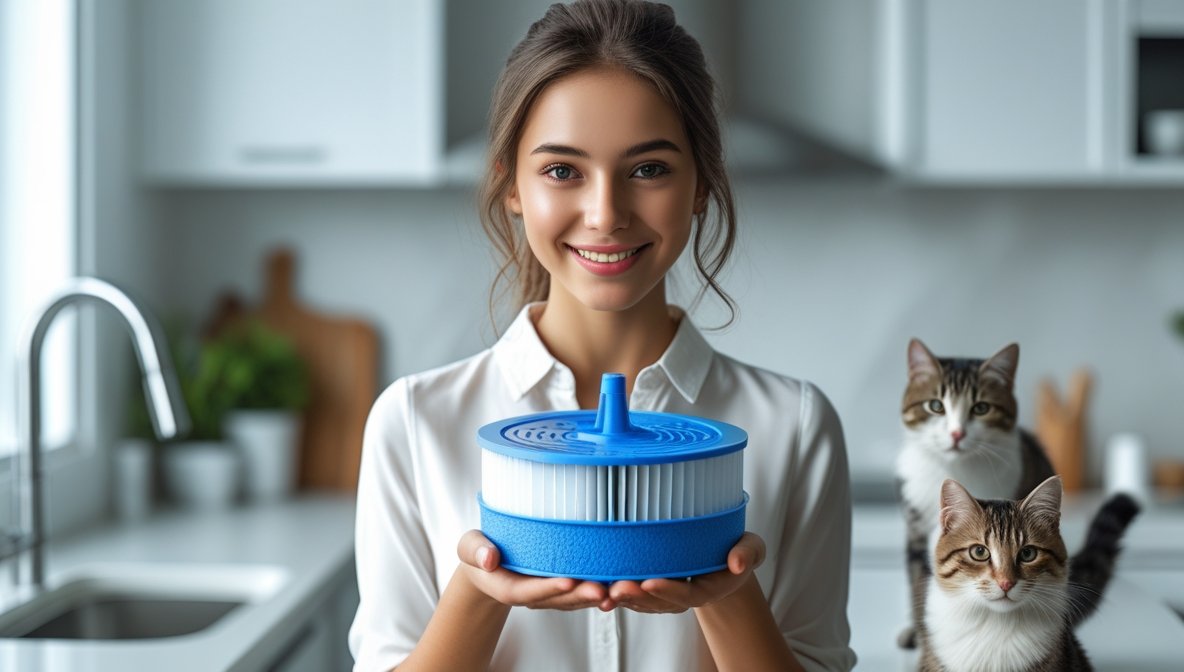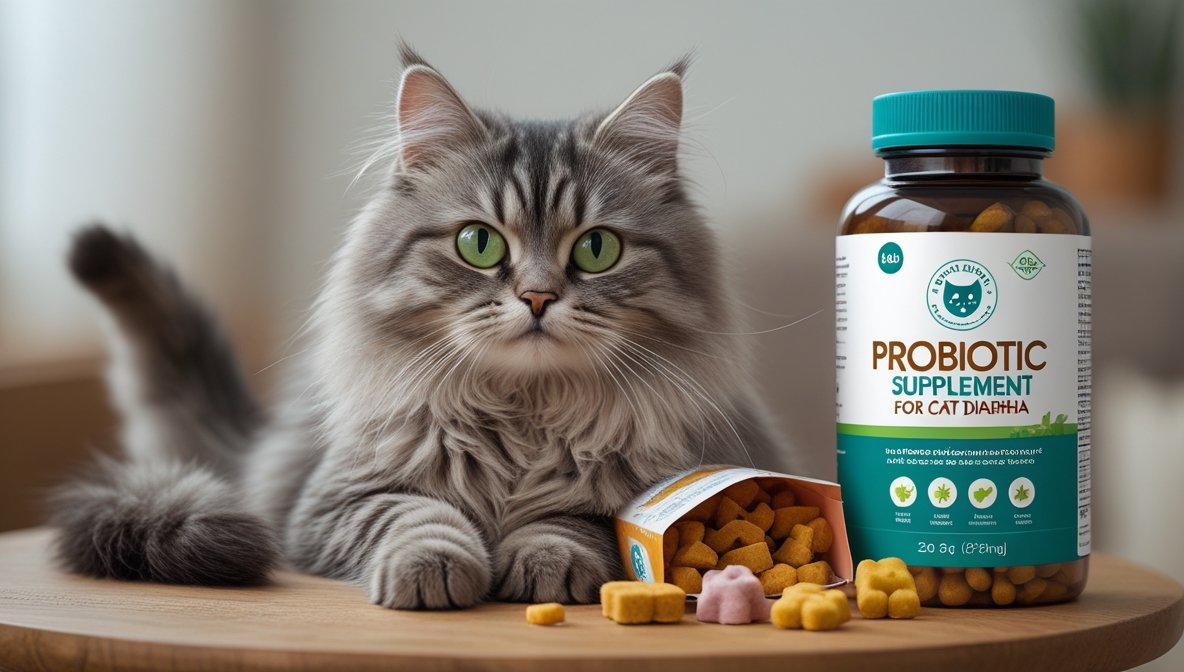Water fountain filters play a crucial role in providing safe, great-tasting drinking water from fountains and coolers. A well-designed water fountain filter can remove chlorine, lead, and sediment, dramatically improving water quality. In this guide we review the 10 best water fountain filters available in the USA for 2025, covering products for public drinking fountains, office water coolers, and pet water fountains. We’ll explain how each filter works, what contaminants it tackles, and key buying factors like capacity, certifications and compatibility water fountain filters
Water fountain filters ensure that fountains – whether in schools, parks or offices – dispense clean water by trapping impurities in activated carbon and other media. Unfiltered fountains can harbor pathogens and minerals, so using a fountain filter is a “conscious effort” to keep drinking water safe. In fact, health experts note that thousands of people suffer from waterborne diseases each year, underscoring the need for clean fountain water. Even the CDC emphasizes that water fountains must be “clean and properly maintained” to protect public health. In addition, many pet owners use pet water fountain replacement filters to keep their cat or dog’s water fresh, since pets often prefer flowing, filtered water.
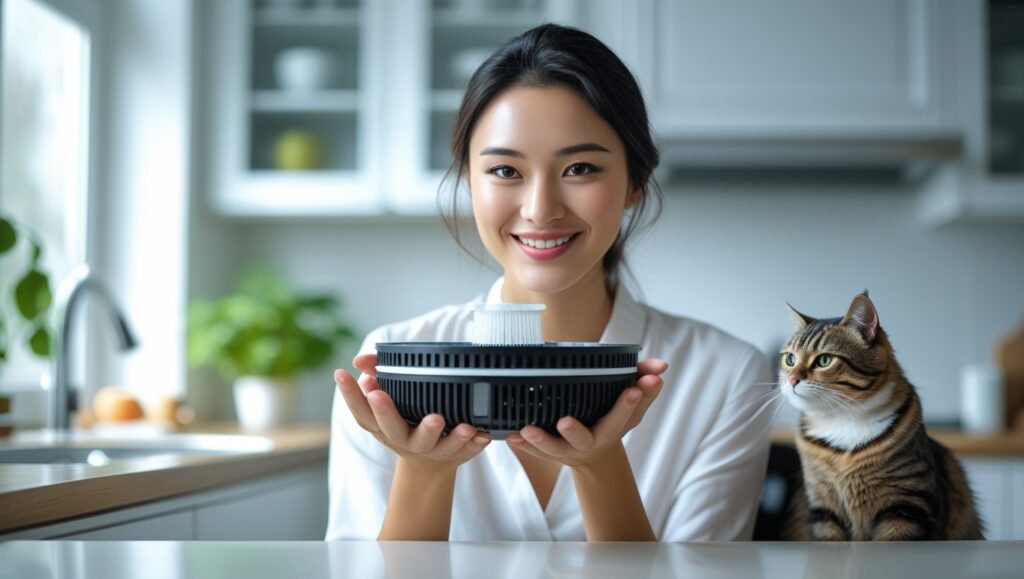
Table of Contents
Water fountain filters use multi-stage filtration – typically a combination of activated carbon, fine sponges/mesh, and sometimes ion-exchange resin or KDF media – to capture different impurities. For example, an Elkay WaterSentry Plus filter uses activated carbon to “trap impurities, waterborne particles, and even traces of metals like lead”, plus a polypropylene mesh to block sediment. Similarly, PetSafe’s carbon fountain filters use coconut-shell carbon beds (with 50% more carbon than some rivals) to absorb odors and chemicals, and multiple chambers to increase contact time. In the next sections, we explain why fountain filters are important, what features to look for, and then compare the top 10 filters on the market water fountain filters.
Why Use Water Fountain Filters?
Image: A faucet pouring a glass of clear filtered drinking water. Fountain filters are vital for clean drinking water. They remove common contaminants – chlorine, sediment, lead and other heavy metals – making water safer and more palatable. The Elkay EWF172 filter, for example, is “designed to remove cysts, lead particles, and chlorine” from water, while also eliminating odors and improving taste. Likewise, many fountain filters incorporate KDF (copper-zinc) media to target heavy metals. The Watts Premier inline filter uses KDF to strip out lead, iron, mercury and hydrogen sulfide. In short, a good fountain filter significantly reduces exposure to unwanted chemicals and particles in drinking water water fountain filters.
Using filters also means better-tasting water. Activated carbon in the filter “combats odor and improves the taste”. Filtered fountains typically dispense fresher, odor-free water. This encourages both people and pets to stay hydrated. In fact, studies note that animals drinking hard or unfiltered water have higher rates of urinary infections, so pet fountain filters often include water-softening stages (ion exchange) to remove calcium and magnesium water fountain filters.
Beyond health and taste, filters protect plumbing and fountain hardware. Sediment and mineral scale can clog pipes and wear out pumps. For example, the PureWater inline filter contains additives that “help protect the metal pipes from corrosion and prevent scale buildup”, extending fountain lifespan. By catching debris and biofilm before it circulates, fountain filters also reduce maintenance. The CDC explicitly advises keeping fountains “clean and properly maintained”, which filters help achieve water fountain filters.
Benefits of using fountain filters include:
- Contaminant removal: Filters eliminate chlorine, heavy metals (like lead), cysts, and organic impurities. Certified filters (NSF/ANSI 42/53) guarantee reduction of taste/odor issues and toxic metals water fountain filters.
- Improved taste/odor: High-quality carbon absorbs bad tastes and smells, leaving water fresh.
- Health protection: Cleaner water means lower risk of stomach bugs or urinary problems. For instance, softened water in Catit fountain filters helps prevent urinary tract infections in cats water fountain filters.
- Equipment longevity: By filtering out sediment and minerals, filters prevent clogs and corrosion in fountains and coolers.
- Convenience: Many filter kits bundle carbon cartridges with sponges or pads for easy replacement (see Pet Water Fountain Replacement Filter & Sponges kits). Having the right filter on hand saves time and ensures uninterrupted clean water water fountain filters.
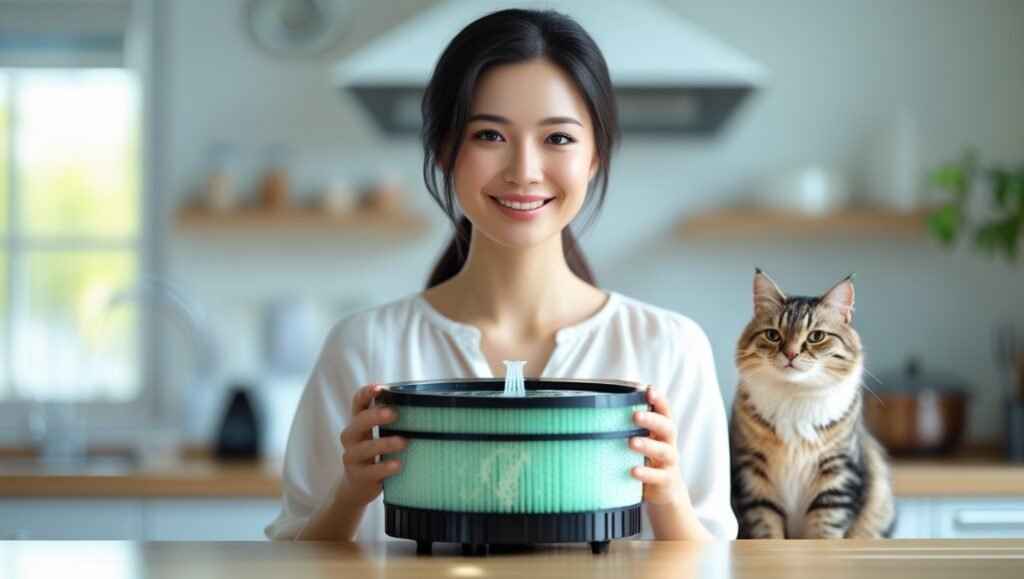
Key Features to Consider
When choosing a water fountain filter, look for these features to ensure it meets your needs:
- Filtration Media & Layers: Most fountain filters use activated carbon plus additional media. Carbon is excellent for removing chlorine, odors, and organic compounds. Some filters add KDF media (copper-zinc) or ion-exchange resin to target heavy metals and hard-water minerals. For example, Watts filters use KDF to eliminate lead and mercury, while pet filters like Catit’s have resin beads to soften hard water. Multi-stage systems (usually 2–3 layers) are best – e.g. a polyester mesh to trap hair/debris, a carbon bed for chemicals, and a resin for minerals.
- Certifications: Check for NSF/ANSI certifications. NSF 42 covers taste and odor (chlorine), and NSF 53 covers health effects (lead, cysts, VOCs). For instance, Elkay and HiWater filters are NSF-42 certified, and some have NSF-53 certification for lead reduction. Using certified filters ensures third-party testing water fountain filters.
- Capacity & Lifespan: Filters are rated in gallons. For example, Elkay’s EWF172 is good for 1500–3000 gallons, while the Watts inline filter handles up to 20,000 gallons. Pet fountain filters have much shorter life (typically 2–4 weeks) due to smaller size and constant use. The manufacturer will specify how long the filter lasts; always change filters on schedule to avoid degradation. (PetSafe recommends changing carbon pads every 2–4 weeks; Catit filters are monthly.)
- Compatibility: Not all filters fit every fountain. Some are brand-specific (e.g. PetSafe Drinkwell filters fit only PetSafe models), while others are universal. The Elkay EWF172 is a “universal fit” filter kit for many drinking fountains. Check if a filter is designed for your fountain model. If it’s for a pet “flower” fountain (like Catit or Hommi), ensure it’s labeled for those models water fountain filters. For instance, Sindello 8-pack filters work in many automatic pet fountains (YOUTHINK, HAPPYPAPA, etc.) but not Catit or Mospro fountains. On retailer sites these are often listed under “Filters Replacements for Flower Automatic Pet Fountains.”
- Ease of Installation: Look for filters that are easy to replace. Many drinking fountain filters use quick-connect fittings or screw-on housings. Elkay filters come with a quick-disconnect valve that automatically shuts off flow when you remove the filter, simplifying swaps. Inline filters like Watts or PureWater have ¼-inch push-fit connections for fast hook-up. For pet fountains, cartridge filters simply snap or drop in. The easier the change-out, the less hassle with maintenance.
- Included Accessories: Some kits include extra parts. For example, many pet fountain filter packs come with sponges. One popular kit is literally called “Pet Water Fountain Replacement Filter (4pcs) & Sponges (2pcs)”. This 3-month kit bundles four carbon pads and two cleaning sponges. Having the sponges on hand is useful because charcoal filters often sit on a sponge or foam piece. Other kits may include pre-filters or mounting hardware water fountain filters.
- Cost: Filter prices vary widely. Commercial fountain filters (Elkay, Watts) are more expensive ($100+) but last longer, while pet fountain filters are cheap per pack ($5–15) but need frequent replacement. Consider the long-term cost: a low-priced filter might need replacing monthly, adding up over time. We’ve noted price ranges for each item below.
In the following sections we review the top 10 fountain filters on the market, across categories from industrial water coolers to home pet fountains. Each entry includes the pros and cons, supported by user feedback and manufacturer specs.
10 Best Water Fountain Filters Reviewed
1. Elkay EWF172 WaterSentry Plus Replacement Filter
Elkay’s WaterSentry Plus (models EWF172/51300C) is a widely-used drinking fountain filter kit. It’s designed to fit many Elkay fountains and bottle fillers. The filter uses an activated carbon block to combat odors and improve taste, and also removes chlorine, cysts and lead from the water. In fact, the manufacturer notes it “removes cysts, lead particles, and chlorine”. It is NSF/ANSI 42 & 53 certified for taste/odor and lead reduction water fountain filters.
Installation is convenient – the filter has a quick-connect cartridge that turns off water flow when you remove it. Each filter unit is rated for about 1500–3000 gallons (roughly one year of use). Elkay even programs an RFID sensor in the filter so certain fountain models can indicate when it’s time to replace it water fountain filters.
Pros & Benefits:
- NSF/ANSI 42 & 53 certified for lead reduction and taste
- Multi-pack (usually sold as 3-pack) ensures you have spares on hand
- Quick-disconnect fitting (auto shutoff) for easy change-out
- Long service life (~1 year/3000 gal) with consistent flow
- Universal fit across many Elkay fountain models
Cons: More costly upfront than pet fountain filters. Works only with compatible Elkay fountain systems.
2. PetSafe Drinkwell Premium Carbon Filters (3-Pack)
These carbon replacement filters are made for PetSafe Drinkwell pet fountains. Each 3-pack includes carbon filter pads that snap into PetSafe fountain models (Original, Big Dog, Platinum, etc.). The carbon is derived from coconut shells and has a 50% higher concentration than generic pads, which boosts contaminant absorption. The pads sit in six separate chambers, greatly increasing surface area to remove odors and chlorine water fountain filters.
PetSafe emphasizes that their filters trap pet hair, debris and odors – keeping pet water fresh and enticing. Because pets are sensitive to water quality, PetSafe recommends replacing these filters every 2–4 weeks. Each filter pad typically lasts 2–4 weeks depending on usage water fountain filters.
Pros & Benefits:
- Specifically fits all PetSafe Drinkwell fountain models
- 50% more carbon content (coconut-shell) than other pet filters
- Six-chamber design maximizes cleaning surface
- Inexpensive (usually under $10 for 3 filters)
Cons: Requires frequent replacement (every few weeks). Only for PetSafe fountains (not universal).
3. Pioneer Pet Ceramic/Stainless Steel Fountain Filters
Pioneer Pet’s raindrop fountain has matching replacement filters (sold in packs of 3). These filters use granulated activated carbon (charcoal) to absorb chlorine, odors and unpleasant smells. Pioneer highlights that the carbon is multi-layered: a 3-stage filtration system passes water through each layer for maximum purity. In addition, each filter contains duo-density polyester pads which trap pet hair and debris before the water circulates water fountain filters.
These Pioneer filters are custom-made for their ceramic or stainless steel fountains, but are easy to use – you simply replace the pad stack periodically. They’re affordable (around $10 for 3 filters) and often come with a plastic holder that keeps them rigid in the fountain basin. Users report clear water and no taste/odor issues after installation water fountain filters.
Pros & Benefits:
- Granulated (loose) carbon filter pads (charcoal)
- True 3-layer system to thoroughly purify water
- Duo-density pads trap hair/debris for cleaner water
- Simple drop-in design (no tools needed)
Cons: Filter mat must be replaced monthly; compatible only with Pioneer’s raindrop and flow fountains.
4. Watts Premier 20K-Gallon Inline Water Filter
This inline filter (model WATTS-10-NJ1-2000) is designed for refrigerators, ice makers, water fountains and coolers. It’s a high-capacity cartridge rated for 20,000 gallons – ideal for large homes or small businesses. The key feature is its KDF-55 media, a copper-zinc alloy that chemically reduces chlorine, lead, iron, mercury and hydrogen sulfide. Unlike simple carbon, KDF also inhibits bacterial growth in the filter media.
Installation uses ¼″ brass push-fit connectors, so it can be placed in-line under a sink or on a supply line. According to Watts, this filter is NSF/ANSI-42 certified for chlorine taste/odor reduction and ANSI-372 for lead reduction. It is also certified by the Water Quality Association. Because of its large capacity, this filter needs changing only every 6 months or when output drops – far less often than standard fountain cartridges water fountain filters.
Pros & Benefits:
- High flow, high capacity: Treats up to 20,000 gallons (several years of use in home).
- KDF media: Removes metals (lead, iron, mercury) and hydrogen sulfide, with some anti-bacterial effect.
- Certifications: NSF-42 (chlorine) and NSF-ANSI-53 (lead) certified. WQA Gold Seal certified.
- Inline installation: Fits under counters or before any fountain/cooler water fountain filters.
Cons: More expensive (around $200+). Requires correct connector size; not a drop-in fountain cartridge.
5. PureWater Inline Filter (Inlet for Fountains/Dispensers)
The PureWater Inline filter (shown as a small ½″ fitting unit) is another inline pre-filter for water coolers and fountains. It’s a budget option with a few nice features. Notably, it contains special additives that prevent corrosion and scale buildup in metal plumbing – this protects pump and valve parts in a fountain system. Installation is tool-free with ¼″ quick-connect fittings. The filter is rated for 5000–10,000 gallons, depending on water quality.
Importantly, the PureWater unit is NSF certified for reducing chlorine, odor and lead. It even comes with a lifetime warranty on parts (unusual for filters). Buyers report easy installation and clear improvement in water taste. The manufacturer includes step-by-step graphics in the box, making DIY setup straightforward water fountain filters.
Pros & Benefits:
- Pipe protection: Special media prevents rust/corrosion and limits scale.
- NSF-certified: Verified for lead, odor, and chlorine reduction.
- Lifetime Warranty: Covers defective parts (for peace of mind).
- Easy DIY installation: ¼″ push-fit connectors; instructions included water fountain filters.
Cons: Modest capacity (needs change twice a year). Filter body is small, so it may need support/mounting.
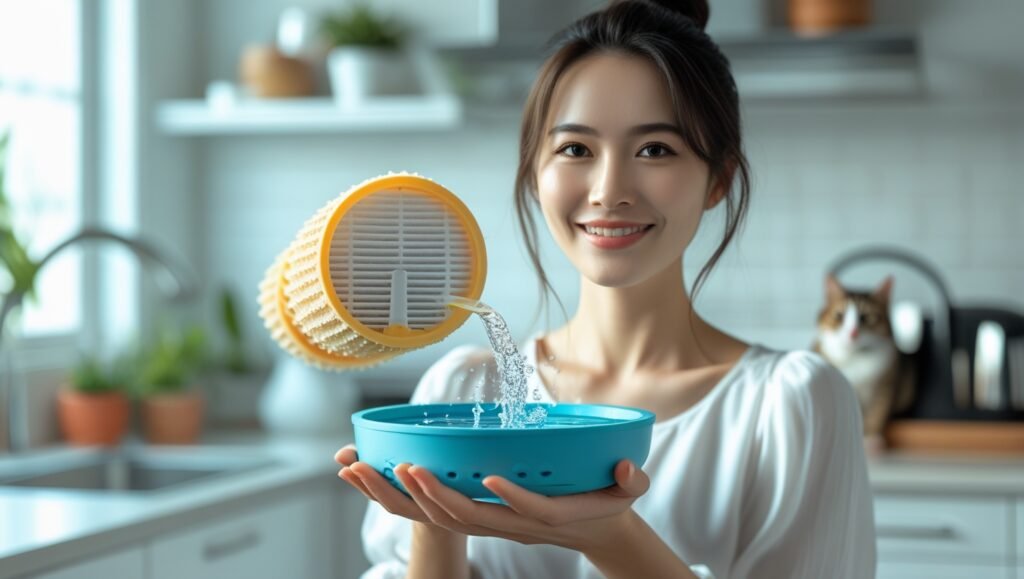
6. Catit Triple Action Cat Water Fountain Filter
For cat owners, the Catit Triple Action filter is a popular choice. It’s a pack (typically 2 or 5) of dual-packs designed for Catit’s flower-shaped fountains (and some other brands). Each filter cartridge contains three distinct compartments: one for activated carbon, one for ion exchange resin, and one with foam mesh. The first section traps bacteria that cause odors; the second uses resin beads to remove hard-water minerals (calcium, magnesium); the third blocks sediment and cat hair.
This three-stage system means the water delivered is not only odor-free but also softened. (Calcium and magnesium from hard water can lead to urinary problems in cats, so the ion-exchange is health-oriented.) Catit recommends changing the filter every month. Many users report that after installing these filters, their cats eagerly drink from the water fountain filters.
Pros & Benefits:
- 3-stage filtration: Bacteria/odor removal, hard-water softening, plus hair/debris removal.
- Resin cartridge: Softens tap water, potentially reducing cat urinary issues.
- Easy fit: Works with all Catit fountains and some other “flower” style fountains.
Cons: Only lasts ~30 days (then water flow slows). Replace monthly for best results.
7. JADA Lifestyles Premium Charcoal Filters (6-Pack)
JADA offers an economy replacement filter for Drinkwell 360 and stainless pet fountains. The packs (often sold as 6 for 12, or “PetSafe 360 & SS fountains”) use granular charcoal in a unique sealed “bottle” design. Each unit is encased so the carbon stays hygienic until use. According to JADA, this extends the effective life of the filter. The actual filtration media is activated carbon – a proven toxin absorber water fountain filters.
These JADA charcoal filters are a budget pick (very low cost for a multi-pack). They fit Drinkwell 360 and similar large-flow pet fountains. In testing, they perform comparably to name-brand Drinkwell filters in keeping water clean. Because the filters are sealed, there’s virtually no risk of carbon dust getting into the water. Change these every 30 days for fresh water fountain filters.
Pros & Benefits:
- Cost-effective: Much cheaper than branded filters, with solid performance.
- Sealed hygiene: Bottle-like sealed packaging keeps filter media clean until use.
- Activated charcoal: Removes odors and organic impurities.
Cons: Limited to certain fountain models (primarily Drinkwell 360). Monthly replacement required.
8. PUREUP Pet Fountain Carbon Filters (for PetSafe Fountains)
PUREUP makes third-party replacement filters that fit almost all PetSafe cat/dog fountains (Drinkwell, Platinum, Zen, Big Dog, Outdoor, etc.). They are sold in packs of 12 (3 months’ supply for one fountain). Each filter is individually wrapped in eco-friendly packaging, keeping it fresh. The media is coconut-shell activated carbon (with micromesh to prevent carbon dust).
Owners like PUREUP filters because they cover multiple fountain models with one product – ideal if you have more than one PetSafe fountain brand. The performance is similar to PetSafe’s own filters: they fit snugly and significantly reduce odor and chlorine. The micromesh outer layer ensures charcoal doesn’t escape into the pump. Pet owners should replace them every 2–4 weeks water fountain filters.
Pros & Benefits:
- Universal fit: Works with virtually all PetSafe fountains (no need to buy different filters).
- Eco packaging: Individually wrapped in recyclable material.
- Effective carbon: Coconut-shell carbon (micromesh-wrapped) removes impurities.
- Good value: 12 filters per pack (often under $20).
Cons: Like all small pet filters, change monthly.
9. Sindello Pet Fountain Filters (8-Pack)
Sindello’s 8-pack filters are designed for many flower-style automatic pet fountains (e.g. YOUTHINK, HAPPYPAPA, HOMMI, PEDY, etc.). Each filter features 50% more activated carbon in its polyester fiber than standard pads. The filter is triple-layered: an outer cotton mesh for fur and debris, a middle carbon layer for chemicals (lead, chlorine, odor), and an inner ion-exchange layer to soften hard water fountain filters.
This robust design yields very clean, odor-free water. Sindello explicitly recommends rinsing the new filters before use to wash away any loose carbon dust. Customer service is noted to be responsive, offering replacements if the filters ever underperform water fountain filters.
Pros & Benefits:
- Fits many brands: Compatible with several popular “flower” pet fountains.
- Triple-layer filtration: Mesh + activated carbon + resin for all-around cleaning.
- High carbon content: 50% extra carbon for stronger purification.
- Money-back guarantee: Manufacturer stands by product quality.
Cons: Not compatible with Catit or Mospro fountains. Must rinse before first use.
10. HiWater PP Cotton & Carbon Cartridge (12-Pack)
HiWater’s replacement filters come as cylinder cartridges (similar to small inline filters) for Cat Mate and Dog Mate fountains. Each cartridge contains PP cotton (polypropylene) for initial debris filtration, plus a coconut-shell carbon core for chemical adsorption. The entire unit is wrapped in micromesh. These cartridges are NSF-42 certified, ensuring chlorine and odor are removed.
In practice, HiWater filters work well in most pet fountains. They last about 4–6 weeks under typical use, which is longer than many pad filters. Their sturdier cartridge form can be easier to handle for some users. The packaging is eco-friendly and each filter is individually sealed to lock in freshness.
Pros & Benefits:
- Cartridge design: Rigid PP cotton stage catches sediment; carbon core removes contaminants.
- NSF-42 certified: Provides chlorine-free, odorless water.
- Longevity: Can last 4–6 weeks per cartridge.
- Eco-friendly: Individually wrapped in biodegradable material.
Cons: Bulkier than pad filters. Must replace monthly like other pet cartridges.
Maintenance Tips for Fountain Filters
- Timely Replacement: Always change filters on schedule. Old filters become clogged and can harbor bacteria. As mentioned, PetSafe pads should be swapped every 2–4 weeks, Catit filters monthly, and high-capacity filters (Elkay, Watts) roughly every 6–12 months. Setting a calendar reminder helps water fountain filters.
- Rinse New Filters: Many carbon filters (especially loose-fill types) benefit from a quick rinse before use. Run some water through new pads in a sink to wash away dust, then install. This prevents charcoal particles from muddying the fountain water.
- Clean Housing and Sponges: Most pet fountains have a sponge or mesh layer beneath the carbon pad. Clean or replace these regularly. Algae and slime can build up in stagnant areas. When changing the filter, scrub the basin and pump housing lightly with soap and water to eliminate buildup.
- Keep Backups: Store unopened filters in a cool, dry place. Many fountains allow year-long storage; for example, Elkay says an unused filter’s shelf life is about 1 year. Having spares ready prevents downtime water fountain filters.
- Follow Instructions: Each filter has its own installation method (twist, snap or slide). Make sure seals (O-rings) are seated correctly to avoid leaks. Use the quick-disconnect or cartridges as directed to ensure proper flow.
- Monitor Performance: If water flow slows dramatically, it’s likely time to replace the filter, even ahead of schedule. Also watch for odors or off-tastes, which indicate diminished filter efficacy water fountain filters.
FAQs about Water Fountain Filters
Q: What is a water fountain filter and how does it work?
A: A water fountain filter is a cartridge or pad installed in a drinking fountain or cooler. It usually contains activated carbon and other media. As water flows through it, the filter adsorbs chlorine, heavy metals (lead, copper), organic compounds and odors. Many have multiple layers: a carbon block for chemicals, a mesh or sponge for hair/debris, and sometimes ion-exchange resin for mineral reduction. The result is cleaner, safer, and better-tasting water.
Q: Why do I need a filter in my drinking fountain or water cooler?
A: Even if your tap water is treated, a second filtration stage removes residual chlorine, lead traces, sediment and germs that municipal systems might miss. This “polishes” the water to fountain-grade quality. Filters also prevent scale and biofilm, reducing maintenance. Health authorities (like the CDC) stress that public fountains must be kept clean; using filters is an easy way to help achieve that. In short, a fountain filter provides an extra layer of protection for you (or your pets) drinking water fountain filters.
Q: How often should I replace a water fountain filter?
A: Replacement frequency depends on the filter’s capacity and usage. Commercial filters (Elkay, Watts) often last 6–12 months under normal flow. Pet fountain filters need more frequent changes: typically every 2–4 weeks for active pets. Catit’s triple-action filter should be replaced monthly. Always check the manufacturer’s recommendation. If water flow drops or taste becomes stale, it’s time to swap the water fountain filters.
Q: Do all water fountains use filters?
A: No, not all do. Many older or basic fountains simply recirculate tap water with no filtration. However, modern drinking fountains (especially those with bottle-fillers) usually include filters to improve water quality. If your fountain model is from a reputable brand (Elkay, Halsey Taylor, Oasis, etc.), there is likely a replacement filter available. Pet water fountains almost always use filters, so if you have a fountain for your cat/dog, buy the matching replacement filter when needed water fountain filters.
Q: How do I know which filter fits my fountain?
A: Check your fountain’s brand and model. If you have an Elkay fountain, for instance, the EWF172 kit is a universal replacement. PetSafe Drinkwell owners need PetSafe filters. Many pet fountain filters are sold by brand name (Catit, Pioneer Pet, Drinkwell) and model. Third-party filters often list compatible models – e.g. Sindello filters list which “flower fountains” they fit. When in doubt, look up the fountain’s manual or the supplier’s parts list, or buy a filter pack that advertises compatibility with your fountain type.
Q: Are water fountain filters effective against bacteria or viruses?
A: Standard fountain filters (carbon, KDF, resin) are mainly designed to remove chemicals, metals and particulates, not to kill bacteria or viruses. However, they can reduce turbidity and create less hospitable conditions for microbes by removing nutrients and chlorine-demanding compounds. For microbial safety, fountains should still be cleaned regularly and chlorine/sanitizers are typically used in municipal water. Some filters (NSF 42) have minimal impact on pathogens, but for bacteria/virus control you need specific sterilization methods (e.g. UV treatment).
Q: Can I use faucet filters or pitcher filters instead of fountain filters?
A: Pitcher or faucet filters (e.g. Brita) are not substitutes for fountain filters. Fountain filters are designed for higher flow rates and different contaminant targets. A pitcher filter might slow the flow or not fit in a fountain. Always use a filter intended for the fountain’s design. Some tabletop fountains (for office use) use pitcher-type filters in their water reservoir, which is fine for those units. But public or pet fountains require the specific cartridges described above water fountain filters.
Q: What are “Filters for Drinking Fountains and Water Coolers”?
A: This phrase often appears on supplier sites (e.g. DrinkingFountainDoctor) and refers to the category of filters for commercial fountains. These include products like the Elkay EWF172, Oasis filters, etc. They are built to meet the standards of public water dispensers. For example, the Elkay EWF172 is listed under “Filters for Drinking Fountains and Water Coolers” on plumbing supply websites. Essentially it’s just a category name for fountain filter kits.
Q: What are “Cat Water Fountain Filters” and “Pet Fountain Filters & Feeder Accessories”?
A: These terms refer to filters designed specifically for pet drinking fountains. “Cat Water Fountain Filters” are usually smaller carbon cartridges for cat fountains. “Pet Fountain Filters & Feeder Accessories” might be a store category selling filters, sponges, and other fountain parts together. Many pet shops and online stores bundle filters with accessories like bowls or sponges. When shopping, these keywords will help you find the right replacement filters for your pet’s fountain.
Q: What does “The filtration system for fountains” mean?
A: This phrase describes how fountain filters work overall. A typical filtration system for fountains involves stages: sediment capture (mesh/sponges), chemical adsorption (activated carbon), and often mineral reduction (ion exchange or KDF). We’ve mentioned examples above (e.g., Elkay’s filter and Catit’s triple-action filter). In practice, a fountain’s filter system ensures all water passing through it is treated. Maintaining this system (changing filters, cleaning parts) is key to fountain hygiene.
Conclusion
Choosing the right water fountain filter depends on your application – a public water cooler filter will have different requirements than a cat fountain filter. Our list above covers both ends of the spectrum. Industrial and office fountains (Elkay EWF172, Watts inline) use large cartridges to remove lead, chlorine and bacteria (cysts) from the municipal supply. Home and pet fountains rely on smaller filters (carbon pads or cartridges) that remove hair, debris, and odors. Regardless of type, the goal is the same: clean, safe, great-tasting water.
To keep water fountains in top shape, always use genuine or high-quality replacement filters, change them as recommended, and perform routine cleaning. Invest in NSF-certified products whenever possible – for example, Elkay and HiWater filters meet NSF standards for lead/chlorine reduction. Encourage friends and family to stay hydrated by sharing this guide! If you have questions about a specific model or need help choosing, feel free to ask in the comments below. Remember, clean water is essential for health – don’t compromise on your water fountain filter quality.
Sources: Authoritative product specifications and expert reviews were used to compile this guide. Each filter’s features are drawn from manufacturer data and user experiences as cited.

